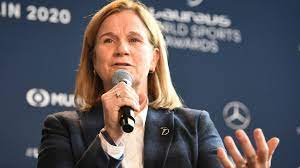By Andrew Warshaw
October 19 – A biennial Women’s World Cup will help “shine a light” on the sport and help it “stand alone” in terms of visibility and investment but is not a foregone conclusion according to former US head coach Jill Ellis.
Ellis is effectively the female equivalent of Arsene Wenger at FIFA, leading a Technical Advisory Group (TAG) on the women’s game made up of players, coaches and other key stakeholders. On Monday she held a media presentation remotely as part of FIFA’s ongoing initiative to bang the drum for a World Cup every two years.
FIFA president Gianni Infantino says a definitive ruling on staging the men’s and women’s World Cup every two years could be taken by December and Ellis revealed it will go to a vote even though there is no full congress due for the rest of this year.
She could not confirm whether such a vote among the FIFA member associations would be taken separately or together. “I don’t know that, I would imagine that you have to look at them independently,” she said. “We’ve had great conversations and people representing their ideas. I can’t say this is a foregone conclusion.”
Ellis is fully aware of the outcry over the very concept of a biennial World Cup but insists the women’s game can only benefit. “A great deal of focus is in place on what is best for the players, we recognise that,” she said.
“The lever that the Women’s World Cup holds in terms of elevating our sport is massive and that’s why the biennial Women’s World Cup is in conversation because we recognise that domestically there’s a benefit – viewership comes up after a major world event, leagues have been started, players have been discovered.
“There’s so many positives that come from a World Cup. This is a democracy, this is going to go to a vote ultimately. We have an opportunity for women’s football to really plot its own course.”
Addressing the international calendar, Ellis says increasing the number of international windows from three to five is under consideration. Such a concept would be anathema to many stakeholders but Ellis believes it would have widespread support once properly digested.
“A lot of people haven’t seen the five-window calendar. We are taking this idea to a broader audience to digest. In terms of the calendar, there has to be a give and take. People are going to fight for their positions, which I respect, but my charge is to look at everyone seated at the table. At this point, we are only taking recommendations forward on the expanded window.”
For many in the women’s game, the Olympics is almost as big as the World Cup in terms of prestige.
Responding to the concerns of the International Olympic Committee that the women’s game would suffer if a biennial World Cup was imposed, the English-born Ellis, who coached the US to two Women’s World Cup titles, countered that the Olympics simply didn’t provide enough opportunities.
“I am not a political animal but if we really care about the women’s game then make it a tournament [Olympics] of more than 12 nations.
“If we want to raise the profile, we need to have more teams participate and have access to participate. I look at it as a player and a coach, and I want it to go big. On this occasion, I feel more access for every little girl to play this game and more visibility for the players to have a voice and get what they deserve, I don’t see it as a negative.
“Having 12 teams [in the Olympics], I think that’s not showcasing our game to the level I think it could. I love the Olympics, I just think it’s very limited in how many teams can access the tournament.”
“I truly believe we should think that our sport at some point can be self-sustaining, and I also think that the way we do that is to get ourselves front and centre more frequently. It must not go to sleep for three years.”
Contact the writer of this story at moc.l1752122682labto1752122682ofdlr1752122682owedi1752122682sni@w1752122682ahsra1752122682w.wer1752122682dna1752122682

